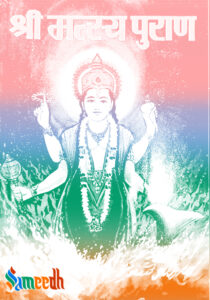The Matsya Puran is one of the eighteen Mahāpurāṇs in Hinduism. It is dedicated to Lord Matsya, the fish avatar of Lord Vishnu. The word “Matsya” means “fish” in Sanskrit. The Matsya Puran is considered an ancient text and, like other Purans, it covers a wide range of topics, including mythology, cosmology, genealogies, legends, and rituals.

The Matsya Puran begins with the story of the creation of the universe and the first avatar of Lord Vishnu, Matsya. According to the text, Lord Vishnu took the form of a fish (Matsya) to save the ancient scriptures (Vedas) and the sage Manu during a great deluge.
The Puran describes various cosmological aspects, including the structure of the universe, the cycles of creation and destruction, and the geography of different worlds. Like many other Mahapurans, the Matsya Puran includes genealogies of gods, sages, and kings. It provides information about various dynasties and their historical contributions.
The Puran includes a conversation between Lord Matsya and the sage Manu, where Matsya imparts knowledge on various subjects, including the principles of dharm, the nature of reality, and the paths to spiritual liberation. Similar to other Purans, the Matsya Purana includes sections on laws, ethical principles, and the concept of dharm (righteousness). The Matsya Puran contains numerous mythological stories, including tales of gods, goddesses, and legendary beings. These stories often convey moral and ethical teachings.
Here are a few popular stories from the Matsya Puran:
- Matsya Avatar (The Fish Incarnation): The primary narrative revolves around the Matsya Avatar of Lord Vishnu. In this story, Lord Vishnu takes the form of a fish to save the ancient scriptures (Vedas) and the sage Manu during a great deluge. He guides Manu’s boat to safety and imparts spiritual wisdom to him.
- King Harishchandra’s Virtue: The Matsya Purana narrates the story of King Harishchandra, renowned for his unwavering commitment to truth and dharm. Despite facing numerous challenges and hardships, Harishchandra remains steadfast in his principles.
- Ganesh and the Moon: There is a tale in the Matsya Purana explaining why Ganesh is worshipped with Durva grass. It involves a competition between Ganesh and the Moon to consume a feast. Ganesh wins but, due to overeating, trips and his stomach bursts. To soothe Ganesh’s pain, the Moon applies Durva grass, which is considered auspicious.
- Dialogue Between Matsya and Manu: The Matsya Puran includes a dialogue between Lord Matsya and the sage Manu. During this conversation, Matsya imparts profound knowledge on various subjects, covering aspects of dharma, philosophy, and the nature of the cosmos.
- Story of Yam and Nachiketa: The Puran contains the story of Nachiketa, a young boy who confronts Yam, the god of death, seeking knowledge about the afterlife and the nature of the soul. This narrative is more commonly associated with the Katha Upanishad, but variations are found in different texts, including the Matsya Purana.
- The Legend of Pururav and Urvashi: Matsya Purana features the love story of Pururav, a king, and Urvashi, a celestial nymph. Their union faces challenges, highlighting the themes of love, desire, and the transient nature of worldly attachments.
These stories, among others, contribute to the rich tapestry of Hindu mythology and convey moral, ethical, and spiritual lessons. Keep in mind that interpretations and versions of these stories may vary across different Purans and regional traditions.